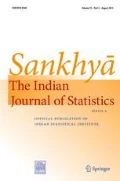Abstract
Given a partition {I1, …, Ik} of {1, …, n}, let (X1, …, Xn) be random vector with each Xi taking values in an arbitrary measurable space \((S,\mathcal {S})\) such that their joint law is invariant under finite permutations of the indexes within each class Ij. Then, it is shown that this law has to be a signed mixture of independent laws and identically distributed within each class Ij. We provide a necessary condition for the existence of a nonnegative directing measure. This is related to the notions of infinite extendibility and reinforcement. In particular, given a finite exchangeable sequence of Bernoulli random variables, the directing measure can be chosen nonnegative if and only if two effectively computable matrices are positive semi-definite.
Similar content being viewed by others
References
Aldous, D.J. (1981). Representations for partially exchangeable arrays of random variables. J. Multivariate Anal. 11, 581–598.
Barron, A., Ross, T. and Watanabe, K. (2014). Bayesian properties of normalized maximum likelihood and its fast computation. IEEE IT Symposium on Information Theory, pp. 1667–1671.
Billingsley, P. (1995). Probability and measure, 3rd ed., Wiley Series in Probability and Mathematical Statistics, John Wiley & Sons, Inc., New York. A Wiley-Interscience Publication.
de Finetti, B. (1938). Sur la condition d’equivalence partielle. Actualities Scientifiques et Industrielles 739, 5–18.
Diaconis, P. (1977). Finite forms of de Finetti’s theorem on exchangeability. Synthese 36, 2, 271–281.
Diaconis, P. and Freedman, D.A. (1980). de Finetti’s theorem for Markov chains. Ann. Probab. 8, 115–130.
Diaconis, P. and Freedman, D.A. (1980). Finite exchangeable sequences. Ann. Probab. 8, 745–764.
Dubins, L.E. and Freedman, D.A. (1979). Exchangeable processes need not to be mixtures of independent, identically distributed random variables. Z. Wahrsch. Verw Gebiete 48, 2, 115–132.
Engelking, R. (1989). General Topology, Sigma Ser. Pure Math. 6, Heldermann. (revised and completed edition).
Hewitt, E. and Savage, L.J. (1955). Symmetric measures on Cartesian products. Trans. Amer. Math. Soc. 80, 470–501.
Hildebrandt, T.H. (1932). On the moment problem for a finite interval. Bull. Amer. Math. Soc. 38, 4, 269–270.
Horn, R.A. and Johnson, C.R. (2013). Matrix Analysis. Cambridge University Press, Cambridge.
Janson, S., Konstantopoulos, T. and Yuan, L. (2016). On a representation theorem for finitely exchangeable random vectors. J. Math. Anal. Appl. 442, 2, 703–714.
Jaynes, E.T. (1986). Some applications and extensions of the de Finetti representation theorem. Bayesian Inference and Decision Techniques 31.
Jurkat, W.B. (1956). An extension problem for functions with monotonic derivatives. Canad. J. Math. 8, 2, 184–191.
Kallenberg, O. (2002). Foundations of modern probability. Springer, Berlin.
Kallenberg, O. (1989). On the representation theorem for exchangeable arrays. J. Multivariate Anal. 30, 137–154.
Kallenberg, O. (2005). Probabilistic Symmetries and Invariance Principles. Springer, Berlin.
Kerns, G.J. and Székely, G.J. (2006). De Finetti’s theorem for abstract finite exchangeable sequences. J. Theoret. Probab. 19, 3, 589–608.
Konstantopoulos, T. and Yuan, L. (2015). On the extendibility of finitely exchangeable probability measures, preprint, last updated: Feb 19. arXiv:1501.06188.
Mitrinović, D.S. (1970). Cauchy’s and related inequalities, analytic inequalities. Springer-Verlag, Berlin.
Moak, D.S. (1990). Combinatorial multinomial matrices and multinomial Stirling numbers. Proc. Amer. Math. Soc 108, 1, 1–8.
Muliere, P., Secchi, P. and Walker, S.G. (2000). Urn schemes and reinforced random walks. Stoc. Proc. Appl. 88, 59–78.
Muliere, P. and Walker, S.G. (2003). Reinforcement and finite exchangeability, manuscript.
Pemantle, R. (1988). Phase transition in reinforced walk and RWRE on trees. Ann. Probab. 14, 1229–1241.
Rudin, W. (1991). Functional Analysis, 2nd edn. McGraw Hill, New York.
Shohat, J.A. and Tamarkin, J.D. (1943). The Problem of Moments. American Mathematical Society, Providence.
von Plato, J. (1991). Finite partial exchangeability. Stat. Prob. Lett. 16, 2, 99–102.
Wood, G.R. (1992). Binomial mixtures and finite exchangeability. Ann. Probab. 20, 1167–1173.
Acknowledgments
The author is supported by a PhD scholarship from Università Bocconi. He thanks Nate Eldredge (Northern Colorado, US) and Pierpaolo Battigalli, Sandra Fortini, Fabio Maccheroni, Pietro Muliere, and Sonia Petrone (Università Bocconi, IT) for useful comments. He is also grateful to an anonymous referee for a careful proofreading that allowed a substantial improvement of the presentation.
Author information
Authors and Affiliations
Corresponding author
Rights and permissions
About this article
Cite this article
Leonetti, P. Finite Partially Exchangeable Laws Are Signed Mixtures of Product Laws. Sankhya A 80, 195–214 (2018). https://doi.org/10.1007/s13171-017-0123-5
Received:
Published:
Issue Date:
DOI: https://doi.org/10.1007/s13171-017-0123-5
Keywords and phrases.
- Finite partial exchangeability
- Signed measure
- De Finetti representation
- True mixture
- Reduced Hausdorff moment problem.



